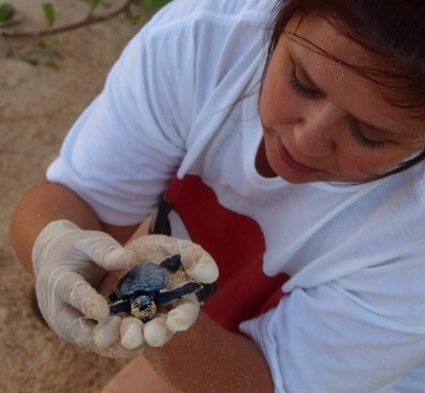THE DEEP BLUE SUSTAINABLE AND RESPONSIBLE TOURIST GUIDE
How to make responsible choices as a traveler that contributes to the social, economic and environmental health of a destination while enhancing your personal experience as a global adventurer.
“WE PROTECT WHAT WE LOVE” – JACQUES-YVES COUSTEAU
SELECTING YOUR DESTINATION AND/OR RESORT
- Choose destinations that are not overcrowded or overdeveloped.
- Support destinations and resorts that have taken action in protecting the environment or their culture such as banning shark fin soup or hunting whales or those that have planted coral gardens.
- Seek out hotels, lodges and resorts that use environmentally sensitive, renewable energy, water and waste disposal systems.
- Look for hotels that have a written policy covering their environmental impact, employment and cultural policy.
- Select lodgings that emphasize local traditions, providing rooms and common areas that reflect the local culture and if possible opt for those that use recycled building materials or those that are harvested in a sustainable manner.
- Always book wildlife-watching trips, safaris and other excursions with a qualified guide who is proven in their responsible practices.
MAKING ARRANGEMENTS
- Book direct flights where possible.
- Consider ways to improve the state of the environment as a result of your visit. Calculate how much energy your travel consumes and how you can find ways to compensate for it. For example, you can plant trees to offset that amount or donate to an organization that will plant them for you. For more information visit Sustainable Travel International’s Carbon Calculator.
- Remember that an ounce of prevention is worth a pound of cure; while it is admirable to offset your carbon footprint, wherever possible, try to minimize your pollution and impact on the environment to begin with.
PREPARING AND PACKING FOR YOUR TRIP
- Foster a true understanding of the natural and cultural environments visited, before, during, and after the visit. Do a little background reading before you go away or ask your travel specialist for advice.
- Take an interest in the culture and traditions of the countries you are visiting. Embrace the differences.
- Be aware of any religious holidays, festivals or other important visit during your stay.
- Educate yourself a little about the currency and the appropriate tipping protocol.
- Learn to speak a few simple phrases in the local language. Also learn some hand gestures if necessary.
- Dress appropriately for the place that you are visiting.
- Consider packing small gifts from home for your hosts or items for members of the local community. Ask your travel consultant about small simple items that can make a difference and the appropriate ways to get these to the people that need them the most.
- Pack as light as possible.
- Leave your hairdryer and other electricity-burners behind…enjoy your hair being teased by the sun and island breeze as part of your vacation if you can!
- Remove packaging from new items that you are taking with you before you pack them – many countries are unable to cope with high levels of waste and don’t have recycling services.
AT YOUR DESTINATION
- Dress and act appropriately for the places that you are visiting.
- Ask before taking photos and respect a person’s wishes if they refuse.
- Support local environmental activities.
- Show respect for natural and cultural heritages and local traditions.
- Go out on excursions that use local guides and drivers. Ask for their insight or engage in a conversation about the history of the area you are visiting.
- Take local advice about which ancient sites and ruins you should visit. Bear in mind that some are considered sacred by the local indigenous people who do not wish outsiders to touch, photograph or even visit. Do not remove archaeological or biological treasures from sites.
- Travel on public transportation, bicycles or even walking when possible. Traveling by your own muscle power where possible has unsurpassed health benefits and reduces already obnoxious levels of carbon dioxide that traveling puts into our atmosphere. Otherwise, public transportation is a much better way to interact with the locals and is better for the environment. Good alternatives include traveling by train which only requires half the energy per passenger mile than planes do or renting a low-fuel consuming, hybrid electric/gasoline powered vehicle. When driving, ensure that your rental car is well tuned, and tires are fully inflated. This will increase your mileage and cut gas costs up to 15%.
- Remember that your guidebook is just that – a guide. It is not your travel bible and it doesn’t know everything. If you want to truly experience a place, head off-the-beaten-path a bit.
- Eat at local bars and cafes. Enjoy the local cuisine and dining experiences whenever you can.
- If you eat seafood, make sustainable choices. Preferably ones that not only do not negatively impact the environment but also support the local trade.
- Take your time. Remember that many cultures move at a much slower pace!
- Be conscientious of your waste disposal. Many places don’t have recycling programs and few pristine places have adequate waste disposal systems. Try to carry out anything toxic like batteries and/or non- biodegradable waste. Avoid using containers made of Styrofoam or non-recyclable plastic and consider packing a water-filtering bottle.
- “Forgetting” waste (tins, plastic bags, rope, ) on the beach or in the water can poison or choke a fish, a sea bird, or a turtle. Some waste takes up to 400 years to break down. So, make a habit of using garbage cans available for your use. In the event there are none, if possible take it with you until you can properly dispose of it even if you are in an area with a lot of litter. Be part of the solution, not the problem.
SHOPPING AND SOUVENIRS
- Buy locally produced products, souvenirs or crafts.
- Do not buy products made from endangered or wild animals and plants including coral, shells, starfish, horns, teeth and animal skins and fur. If in doubt, don’t buy.
- Although bargaining is expected in many cultures, don’t pinch pennies when negotiating. You may get carried away when trying to find the best deal possible but keep in mind how this affects others. Pennies to you may mean as much as an entire family’s meal. Always be sure to bargain with good humor and remember that in many cases you are likely far better off than your hosts. In good trade, both parties are satisfied.
- Do not give money to begging children.
AT YOUR ACCOMMODATION
- Reduce the use of natural resources where possible.
- Take short showers rather than baths.
- Reuse towels and bed linen rather than having them replaced daily.
- Turn down/off heating and air-conditioning when not required.
- Turn off all lights, TV’s and appliances when you leave your room.
- As well as using water and energy sparingly, help to reduce waste by using cloth bags instead of plastic, and re- using plastic cups and water bottles.
SPECIAL CONSIDERATIONS FOR ANIMAL ENCOUNTERS, WILDLIFE TRIPS AND IN THE WATER
- Do not have your photo taken with any “wild” animals. These animals are often taken from the wild when young, and then mistreated and killed when they get too large or difficult to handle.
- Worldwide, many animals serve travelers by carrying baggage and serving as transportation. Sadly, some are badly cared for, overworked and/or overloaded. Keeping animals that serve tourism interests in good health is costly. However, travelers can promote animal welfare by rewarding their patronage to tourism providers who take care of their animals. Travelers should always pay a fair price, usually $100 USD/Euro per person per day which may include a meal and outside of the U.S., overnight accommodation. Travelers should also make responsible decisions related to animal-based tourism (e.g. heavy people should not ride on thin horses) and report animal abuse to major animal welfare programs like PETA (People for the Ethical Treatment of Animals).
- In the natural environment, wild animals can easily be disturbed, harming their chances of survival. Keep your distance, and don’t pursue animals that run/fly/swim away. When observing them, try to be extremely quiet so not to disturb it or its habitats, as animals lose quite a bit of feeding and breeding energy while fleeing from human approach. Never attempt to feed wild animals – not even by leaving food for them after you have left the area.
- Consider taking a trip to see dolphins in the wild rather than opting for a swim-with experience. Dolphins find captivity very stressful because they are large, intelligent animals. Keep in mind that the fleeting moment of an experience with a wild creature on its terms is indescribably more gratifying than an hour with a captive one required to perform for your amusement.
- Do not remove and avoid touching or stepping on any coral when swimming or diving, it’s extremely fragile and takes decades to grow.
- Do not take anything from the ocean. Even a small and seemingly empty shell can be the home of a tiny hidden creature and is all part of the life cycle in the sea. Taking a few underwater samples as “souvenirs” – a fish, starfish, or a piece of coral weakens the delicate natural balance, which takes years to rebuild. Leave the sea its treasures; Take only pictures, leave only bubbles.
- Educate yourself about “canned” experiences where a tour offers an unnatural experience with a wild creature. Some operations are causing more harm than awareness and education and encourage unnatural behaviors that can have a serious long-term impact on these animals.
- Be sure to familiarize yourself and follow all advisories, rules and regulations when visiting protected areas, marine parks and wildlife habitats. Whether they’re voluntary or required, the fees you pay to enter these areas support local efforts to conserve them. Contribute financially where possible when a donation or fee is voluntary.
- Stay on the trails or within designated areas and leave these areas cleaner than you find them.
WHEN YOU RETURN HOME
- Remember that your travel choices make a difference. Provide feedback to travel providers and accommodations as well as government agencies that manage the areas you visit. Fill out their comment cards and suggest steps management might take to integrate sustainable business practices into their operations, providing examples whenever possible.
- Distribute your responsible travel tips. In addition to telling family and friends about the wonderful memories you made, also consider sharing tips on how they too can positively impact the world while having an amazing journey.
- Sharing your photos can say a thousand words.
- Explore more. Traveling is just the start of learning. Once you return home continue exploring and being involved with the issues or region that captured your attention. Build upon your knowledge and also learn about another fascinating place.
- Give back. Traveling often opens your eyes and heart to something new. You can continue to preserve our inspirational World Heritage sites for generations to come by making a donation to a local charity or help by promoting and supporting conservation efforts abroad from home.
“BY CHOOSING TO STAY IN GREEN ACCOMMODATIONS WHEN YOU GO ON HOLIDAY, YOU ARE MAKING A POSITIVE DIFFERENCE TO THE ENVIRONMENT AND LOCAL COMMUNITIES IN THE DESTINATION YOU ARE VISITING.” – THE TRAVEL FOUNDATION
Written by Cheryl Patterson. Contributions:
- Sustainable Travel International
- “Making Tourism Count – Guidelines for Good Practice” – Funded by UK Travel Foundation
- “Ten Rules for Responsible Travelling” – Nordic UNESCO World Heritage Foundation
- The Travel Foundation
- Make Holidays Greener
- Global Sustainable Tourism Council
Useful guides and links:
- “How to be a ‘coral-friendly’ diver” – Courtesy of the Coral Reef Alliance and co-endorsed by the Project AWARE Foundation.
- “Whale and Dolphin Watching Guide” and “Turtle Watching Guide” – Courtesy of the Coral Reef Alliance
- “Seafood Watch Cards” – Making sustainable seafood choices – Courtesy of the Monterey Bay Aquarium





Reviews
There are no reviews yet.